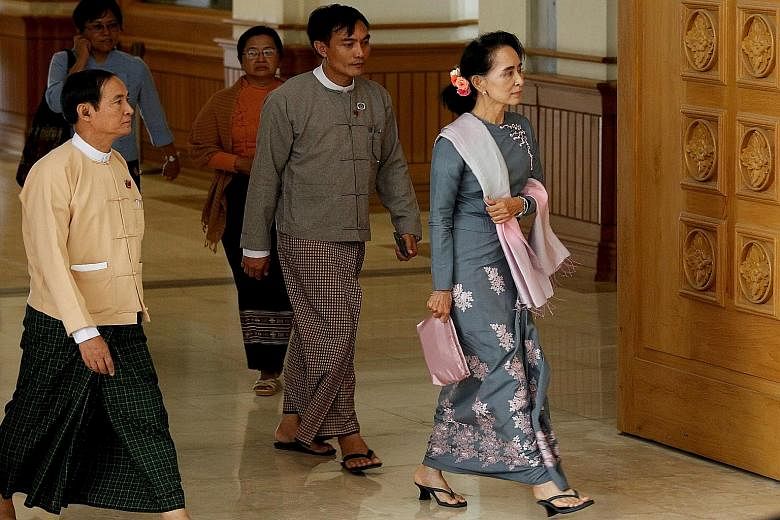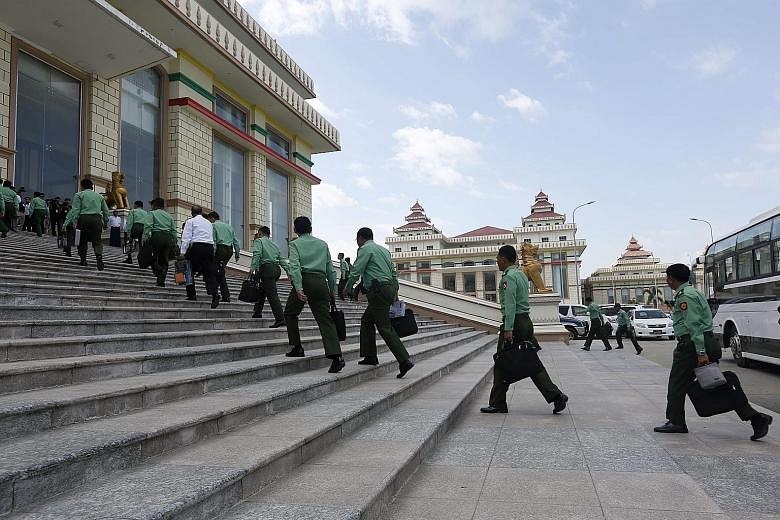When 70-year-old Aung San Suu Kyi walked into Myanmar's Parliament in Naypyitaw yesterday, it was as a queen-in-waiting.
The current Parliament will work through its last session until Dec 31, and although Ms Suu Kyi's National League for Democracy (NLD) scored a 400-seat landslide in the Nov 8 election, it must sit tight until January to take its place as the majority in Parliament - and until late March to actually form the government.
The NLD may be lapping at the firewalls of the powerful military, which still has a constitutionally guaranteed 25 per cent of parliamentary seats, but until March, the country likely faces political limbo and reform uncertainty.
When the party does take over to dish up the country's first taste of civilian rule in almost 50 years, it will confront a range of challenges, from reducing poverty and building infrastructure, to managing natural resources and bringing alienated ethnic minorities into the political process.
But in crowded towns and distant villages, most of the roughly 30 million eligible voters used to the army's authoritarian decades have high hopes of improved prosperity under the NLD and a democratic future.
In densely packed downtown Yangon, it was back to business as usual just days after the landmark election. The political paraphernalia had already disappeared, reduced only to next year's calendars with Ms Suu Kyi's face on them, hawked by vendors at car windows in the struggling, fender-to-fender traffic.
Behind a pile of tiny oranges, between the sidewalk stalls and sizzling woks in teeming Maha Bandoola road, first-time voter Ma Maw broke into a broad smile and flashed a thumbs-up when asked what she expects from an NLD government.
"Everything is going to change," said the 42-year-old fruit seller emphatically. "Everything is going to be better."
In the New York Goldsmith and Jewellery store at the edge of Yangon's Chinatown, owner Kyin Sein, 57, similarly believes change is in the offing. "I think there will be more freedom for business," he said. "It will be better under an NLD government."
"When we have a real democracy, the economy will do better. We will catch up with the rest of the world. We want change, that's why we supported the NLD."
Asked what needs to be fixed, he could only muster an embarrassed smile and say: "I don't know."
It is these wide, but non-specific expectations, which equate democracy with economic growth, that will be a huge challenge for the NLD when running a complex country with multiple competing forces - and which will still have strong vestiges of the old military guard.
"People do have high expectations and you can't blame them. The Lady (as Ms Suu Kyi is known) is a special symbol in people's heads," Yangon-based development consultant Thuta Aung told The Straits Times. "Everyone has been frustrated for a very long time and the NLD is seen as a symbol of hope."
He said: "But they have never ruled before. In a way, she has been lucky; she has never had to perform, except as in opposition. So she hasn't done badly, yet.
"She will be under pressure to perform, and when in power, she can't get away with good speeches. And she can't blame the party either; she is responsible because everyone voted for her party because of her.''
The coming four or five months of potential limbo will present varying degrees of uncertainty. The new Parliament convenes on Jan 31 - yet the current government continues running the country until the new President and Cabinet are appointed at the end of March.
The current government's own reformers now have less traction.
President Thein Sein's key men - for example, minister Aung Min, his peace negotiator; and Soe Thane, his economic reform czar - have lost their political capital.
Mr Aung Min lost his election. Mr Soe Thane won, but will be reduced to a thin backbench in the next Parliament. Both are ex-generals and insiders say they knew how to deal with the army and with the military-dominated administration.
The NLD will have to learn to do both from scratch.
"There is every possibility of deadlock," warned one Yangon-based political analyst, who asked not to be named.
Delivering on the party's campaign promise of "real change" will not be easy but Mr Thuta Aung said Ms Suu Kyi's leadership could make the difference.
"On a positive note, because she is a very symbolic figure, she can demand things to be done and that influence can get things done," he said.
"Everyone who is sensible will understand that the NLD has very little or no capacity, but at the same time because of her, anyone who is capable of assisting, will assist.''
Mr Lin Zaw Min, a consultant with The Youth Development Initiative in Yangon, had a similar view. He said he was not worried about a lack of competency for key positions because Myanmar professionals living overseas would flock back to the country to help the NLD.
He acknowledged that expectations were high, but they should be tempered.
"People have to understand that you don't build a country with one election, you build it piece by piece over decades. She (Ms Suu Kyi) can lay the foundation and the next generation can take over."
U Tin Oo, NLD co-founder and patron who masterminded the party's poll campaign, acknowledged that it must build bridges.
"Even though the NLD has won the majority, we cannot neglect those who failed," he said in an interview at his home in Yangon.
"There are some very efficient and competent Members of Parliament. We have to consider these people, even though they failed. Cooperation and collaboration is a must. We must try, for our people, to work together."
One man in Maha Bandoola was taking it all in his stride. Retired teacher Hla Tun, 84, reading a daily newspaper with Ms Suu Kyi on the front page, grinned widely when asked about his expectations.
"It won't make much difference," he said. "Whatever happens is because of karma in the past. So, I don't get too excited about the NLD winning."


